commentary Commentary
Commentary: Maradona was a great footballer, but he was also much more
The 60-year old’s passing on Wednesday reveals how the adulation of him is unprecedented and rightly so, says John Duerden.
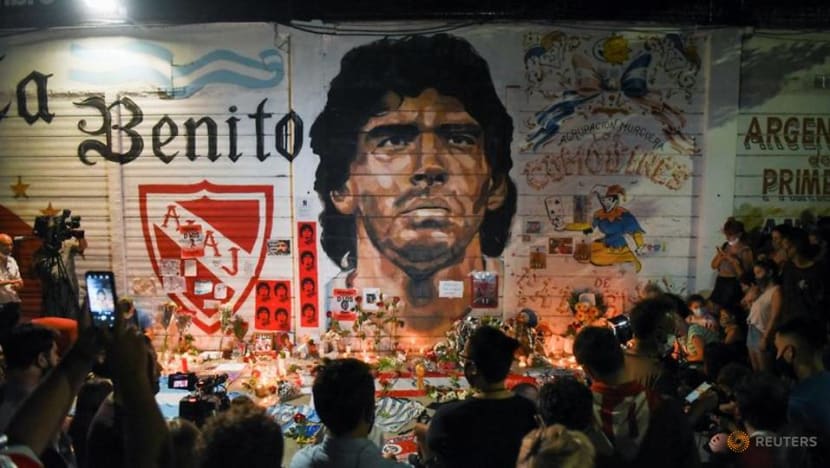
FILE PHOTO: People gather to mourn the death of soccer legend Diego Maradona, outside the Diego Armando Maradona stadium, in Buenos Aires, Argentina November 25, 2020. REUTERS/Martin Villar
SINGAPORE: The footballing world is mourning the passing of Diego Maradona, who died of a heart attack at the age of 60 on Wednesday (Nov 25), who was one of the greatest players of all time and one of its greatest characters.
Alberto Fernandez, the president of Argentina, declared three days of national mourning, an unprecedented gesture for a football player.
He tweeted: "You took us to the top of the world,” Fernandez said. “You made us immensely happy. You were the greatest of all. Thanks for having existed, Diego. We will miss you for life."
Around the world, fans, players and coaches took to social media to express their condolences and share memories of the Argentine. “Everyone is waiting for words from us,” said a statement from Napoli.
READ: 'Diego left a mark on my life': Tributes paid to football legend Maradona after death
READ: FIFA should retire No. 10 shirt after Maradona death - Villas-Boas
Maradona led the Italian team to date their only Italian league championships in 1987 and 1990 when the Serie A was widely regarded the best league in the world.
“But what words could be possible use for pain as strong as that we are currently experiencing? Now is the time for tears. Later, it will be words."
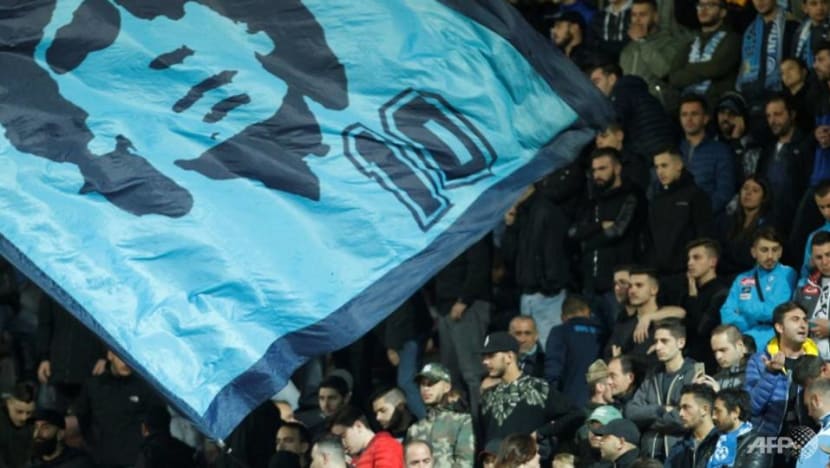
Much of the adulation is due to the fact that Maradona, who started out with Boca Juniors in Buenos Aires and then joined Barcelona in 1982 for a then-world record fee of US$7.6 million, was simply a great player.
BEST OF HIS TIME
Few can argue that he was the best player of his generation and there are many who believe he was the best player ever – even better than the iconic Pele, who won three World Cups with Brazil from 1958 to 1970 and better than Lionel Messi and Cristiano Ronaldo, the pair whose period of domination in the 21st century is still continuing.
READ: Commentary: Messi and Ronaldo are the best ever. We will not see any more like them
If leading Napoli to two Italian championships was his greatest achievement at club level, then winning the 1986 World Cup for Argentina will never be forgotten.
It is hard to think of another edition of the biggest sporting event on the planet that was so dominated by one player. Maradona was simply sublime at a time when attacking players did not receive the same protection from referees as they do in the modern game.
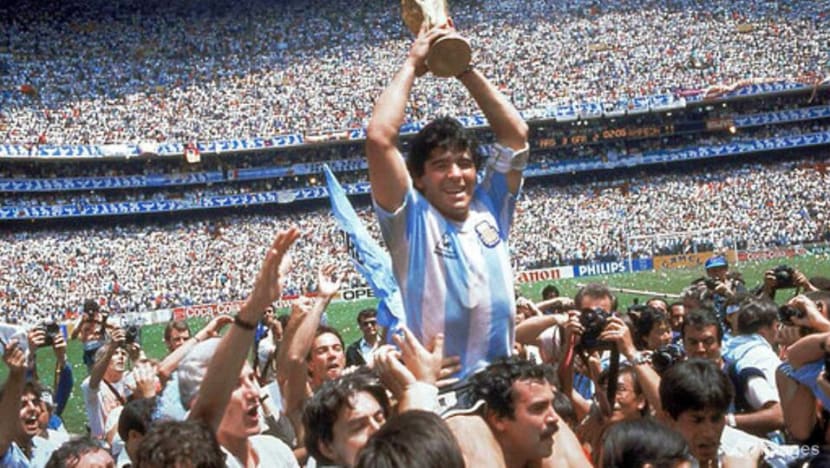
He played in every minute of the tournament that took place in Mexico, finishing as top scorer with five goals and also recorded five assists.
Good in the group stage as Argentina defeated defending champions Italy, he was great in the knockout rounds. His performances against England in the quarter-final, then Belgium and then in the 3-2 win over West Germany in the final were unforgettable.
UNPRECEDENTED ADULATION
This tournament provides some answers to the question as to why Maradona is remembered with such affection and why his country is going through three days of mourning.
READ: Commentary: Salim Moin’s death reminds us of a rare breed of Singapore footballers
There have been other great players who have passed away such as Johan Cruyff of the Netherlands in 2016, Portugal’s Eusebio in 2014 and George Best of Northern Ireland in 2005.
All were legends of the game and their passing was mourned but not to the same extent as Maradona. Messi and Ronaldo are regarded as greats but do not command the same affection.
At the 1986 World Cup Maradona was magnificent. Without him, Argentina would not have come close to winning. Messi and Ronaldo have not led their respective countries, Argentina and Portugal, to the biggest prize and it is unlikely now they ever will.
The quarter-final sums up the player. In front of 115,000 fans in Mexico City, Maradona ran through the entire English defence to score a goal that is regarded as the best ever at the World Cup.
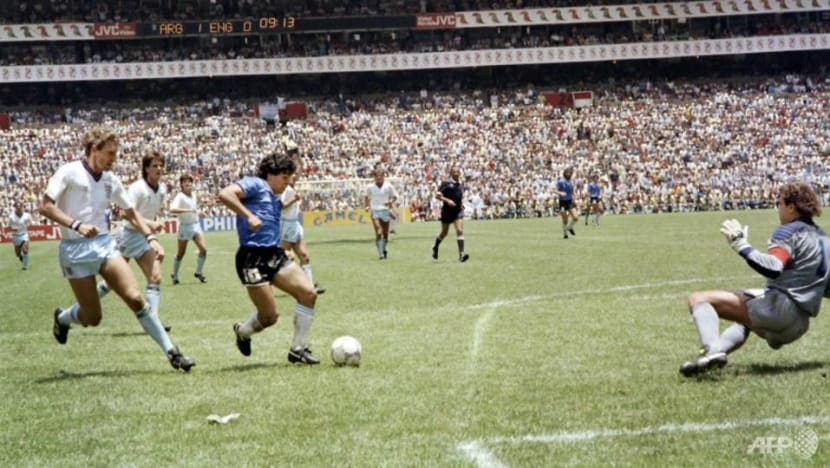
It came just four minutes after the most notorious -"The Hand of God". That was when Maradona punched the ball over English goalkeeper Peter Shilton and into the net.
For a long time, Maradona was hated in England for that 2-1 defeat. Such feelings have faded but the recognition of his greatness has not.
“[By] some distance the best player of my generation and arguably the greatest of all time,” wrote English striker Gary Lineker, who scored in the game. “After a blessed but troubled life, hopefully he’ll finally find some comfort in the hands of God.”
That will to win, the impishness endeared him to many. When at Napoli, as he broke the traditional dominance of the big northern teams, he threw himself into the culture and atmosphere of the southern city and fans loved him for that just as much as for his skills.
SPEAKING HIS MIND
Off the pitch he was as flamboyant as he was on it and was happy to speak out against the powers-that-be and the football establishment such as Pele and FIFA.
In an interview with Pele once, Maradona cheekily took a jibe at the Brazilian legend for his haul of 1,281 career goals. “Who did you score them against? Your nephews in the backyard?” Maradona asked as the two stars often publicly bickered over who was the greatest footballer ever.
But even Pele put that rivalry behind him and joined the world in mourning for his one-time adversary. “I have lost a dear friend, and the world has lost a legend,” the 80-year-old three-time World Cup winner said. “One day, I hope, we will play football together in the sky.”
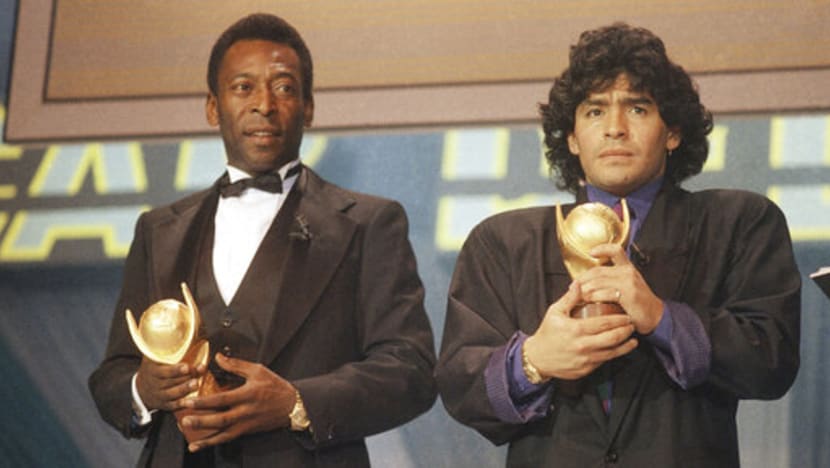
The fact that Maradona got into trouble won him more admirers than permanent enemies as ESPN’s Gabriele Marcotti said.
“But it's not lost on anybody that he eventually made up with virtually all of his adversaries. He didn't seek their forgiveness; he simply made it impossible for most to stay angry at him ... But if you were close to him, you couldn't resent him. You fed off his greatness.”
A VOICE OUTSIDE OF FOOTBALL
Unlike many other football greats who have come before and after Maradona who are seen to be more interested in their reputation and riches, Maradona took a keener interest in daily and global affairs, often using his fame to voice opinions.
READ: Commentary: Can we expect another fairy-tale EPL season?
Messi has been at the top of the game for longer than his compatriot but says little when the final whistle sounds. Ronaldo has also been breathtakingly consistent but his excellence seems almost machine-like when compared to Maradona’s and he lacks the humour, flamboyance, fallibility and relatability of the Argentine.
For Maradona, politics was as much a part of his life as football was and that made him an endearing and relatable personality to the masses.
His love for leftist leaders in South America saw him imbibe a tattoo of Cuban revolutionary Che Guavara on his right arm and former Cuban president Fidel Castro on his left leg.

His deep friendship with Castro, who Maradona infamously called his “second father” raised many eyebrows but continued to blossom, especially in the early 2000s when he spent time in Cuba to recover from a drug addiction.
“He opened Cuba's doors to me when clinics in Argentina were slamming them shut because they didn't want the death of Maradona on their hands,” he said, adding that during the four years he spent in the country, the Cuban leader would take morning walks with him discussing politics and sports.
In 2005, Maradona interviewed Castro for a television show in which both personalities made scathing attacks on the American leadership and called then-president George W Bush a “fraud” and “terrorist mafia”.
He was also close to former Venezuelan president Hugo Chavez and once appeared on a television show hosted by politician to voice his discontent on American foreign policy.
Even when he played football, politics was at the back of his mind.
In his autobiography I am Diego published in 2000, Maradona described the political significance of the memorable 1986 World Cup win over England by invoking memories of the 1982 Falkland Islands war where Argentina was defeated by Britain.
READ: Commentary: Spanish domination of European football is nearing its end
"It was more than trying to win a game. We said the game had nothing to do with the war. But we knew that Argentines had died there, that they had killed them like birds. And this was our revenge. It was something bigger than us: We were defending our flag,” he wrote.
A DIVINE MORTAL
That is perhaps what distinguishes Maradona from many of the game’s other greats – that ability to entertain on and off the pitch, that dynamo-sized fearless figure who wore his heart on the sleeve whether he was playing football or making political statements.
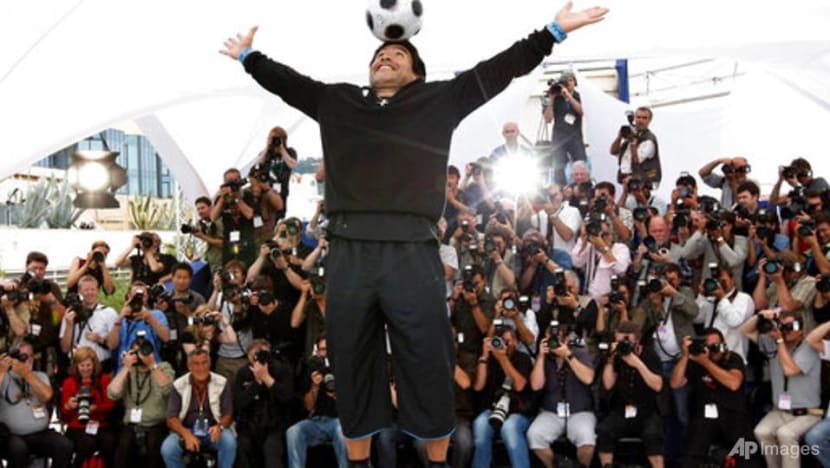
Some may believe that it is because of these qualities that Maradona’s shortcomings – be it drug abuse or links with the underworld – are overlooked and make him the subject of adulation of many.
READ: Nadal leads tennis world in paying respect to Maradona
READ: Argentine football genius Diego Maradona saw heaven and hell
On the contrary, it is because, and not in spite of, his weaknesses that make him an appealing and loved personality.
Maradona – a man with divine brilliance in footballing skills but also a mere mortal with shortcomings and emotions that fans world over could identify with.
John Duerden has lived in Asia for 20 years and covers the region’s sporting scene. He is the author of three books including Lions & Tigers - The History of Football in Singapore and Malaysia (2017).















